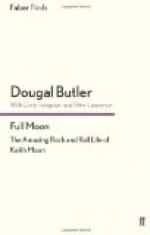ARTHUR J. REES
1922
“There is no help for
all these things are so,
And all the world is
bitter as a tear,
And how these things
are, though ye strove to show,
She would not know.”
—Swinburne
CHAPTER I
The voice of the clergyman intoned the last sad hope of humanity, the final prayer was said, and the mourners turned away, leaving Mrs. Turold to take her rest in a bleak Cornish churchyard among strangers, far from the place of her birth and kindred.
The fact would not have troubled her if she had known. In life she had been a nonentity; in death she was not less. At least she could now mix with her betters without reproach, free (in the all-enveloping silence) from the fear of betraying her humble origin. Debrett’s Peerage was unimportant in the grave; breaches of social etiquette passed unnoticed there; the wagging of malicious tongues was stopped by dust.
Her husband lingered at the grave-side after the others had departed. As he stood staring into the open grave, regardless of a lurking grave-digger waiting to fill it, he looked like a man whose part in the drama of life was Care. There was no hint of happiness in his long narrow face, dull sunken eyes, and bloodless compressed lips. His expression was not that of one unable to tear himself away from the last glimpse of a loved wife fallen from his arms into the clutch of Death. It was the gaze of one immersed in anxious thought.
The mourners, who had just left the churchyard, awaited him by a rude stone cross near the entrance to the church. There were six—four men, a woman, and a girl. In the road close by stood the motor-car which had brought them to the churchyard in the wake of the hearse, glistening incongruously in the grey Cornish setting of moorland and sea.
The girl stood a little apart from the others. She was the daughter of the dead woman, but her head was turned away from the churchyard, and her sorrowful glance dwelt on the distant sea. The contour of her small face was perfect as a flower or gem, and colourless except for vivid scarlet lips and dark eyes gleaming beneath delicate dark brows. She was very young—not more than twenty—but in the soft lines of her beauty there was a suggestion of character beyond her years. Her face was dreamy and wayward, and almost gipsy in type. There was something rather disconcerting in the contrast between her air of inexperienced youth and the sombre intensity of her dark eyes, which seemed mature and disillusioned, like those of an older person. The slim lines of her figure had the lissome development of a girl who spent her days out of doors.
She stood there motionless, apparently lost in meditation, indifferent to the bitter wind which was driving across the moors with insistent force.




